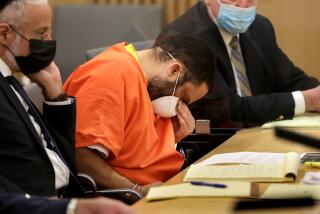Thousand Oaks Teen-Ager Gets 3 Years in Girl’s Slaying : Sentencing: Judge gives youth 10 1/2 years, but since he was tried as a juvenile and convicted of involuntary manslaughter, he will serve less time.
- Share via
A Thousand Oaks teen-ager who shot his girlfriend to death while playing with a loaded gun was sentenced to 10 1/2 years in the California Youth Authority by a Superior Court judge Monday.
But because the boy, who turned 18 last month, was tried as a juvenile and convicted of involuntary manslaughter--rather than murder--state law requires him to serve only until he turns 21, or three years in the juvenile detention system, authorities said.
After the hearing Monday, Ingrid Reay French, clutching a photograph of her 16-year-old daughter, Jacqueline Reay, told reporters that the boy who killed her daughter had not been justly punished.
“No, I’m not satisfied with the judgment,” French said. “But as I’ve said all along, he will be judged by a higher judge. And he will have to live the rest of his life knowing that he killed my daughter.”
The convicted teen-ager showed no emotion as Judge Charles W. Campbell Jr. handed down his sentence after an emotional 2 1/2-hour hearing in which family members of both the defendant and the victim testified.
The boy’s mother, a former schoolteacher, a clinical psychologist and the teen-ager himself appealed to the judge to send him for one year to a remote treatment center in Utah rather than to turn him over to the custody of the California Youth Authority.
Psychologist Harold L. Burke told the court that the youth would be closely supervised at the Utah center, where he would receive proper care for an attention-deficit disorder that contributed to his aggressive behavior.
Burke also said the boy, who is 6 feet, 4 inches tall and weighs 240 pounds, “needs to burn off some testosterone” and that the treatment center could help him do so by providing him with such beneficial physical exercises as canoeing, skiing and horseback riding.
But Deputy Dist. Atty. Donald C. Glynn dismissed those arguments, saying that to enroll the defendant in a “residential program in Utah where he can go skiing and canoeing for one year would be a gross injustice.”
During her testimony Monday, French said that too much consideration was being given to the assailant, rather than to her daughter, the victim.
“I’m wondering what can be done for Jacqueline, who will never have a chance to grow up, to graduate and fulfill her dream as a marine biologist,” said a tearful French, who moved from Newbury Park to Nevada in October after the trial. “We can never bring her back.”
India Reay, Jacqueline’s 24-year-old sister, read a letter from her sister’s best friend, Sharleen Hess, who was too emotional to testify. Hess wrote that she thought Jacqueline’s assailant should get the maximum sentence available.
Judge Campbell agreed, noting that the youth had already spent several years in private treatment centers but that his aggressive behavior had not changed.
“He’s been given chances, and he hasn’t taken advantage of them,” Campbell said.
Campbell recounted how the youth had repeatedly pointed a 9-millimeter, semiautomatic handgun at the victim and others all afternoon July 13, before fatally shooting Jacqueline once in the eye in the kitchen of her Newbury Park condominium.
“I’m convinced he knew that pointing the gun at people was dangerous and that was the whole reason he did it,” Campbell said. “He was waving the gun around, and threatening people just to entertain himself. He should have known it was going to go off.”
More to Read
Sign up for Essential California
The most important California stories and recommendations in your inbox every morning.
You may occasionally receive promotional content from the Los Angeles Times.













